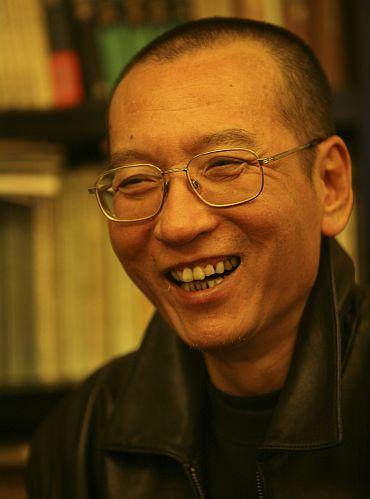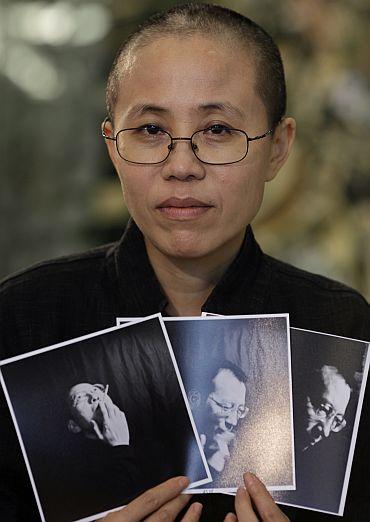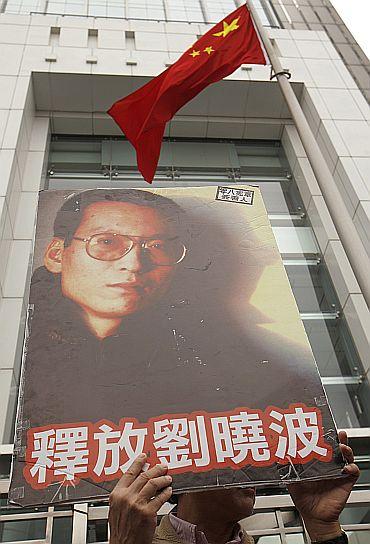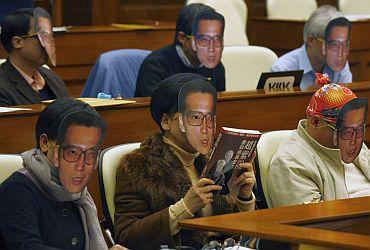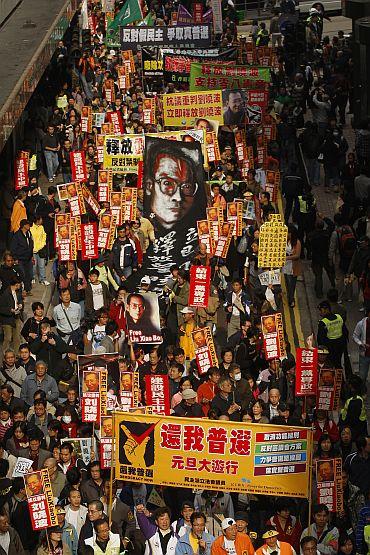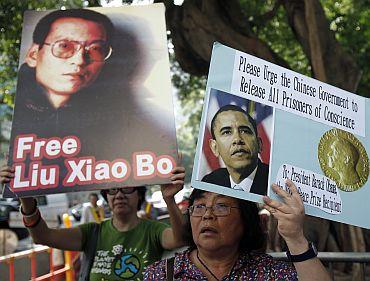 | « Back to article | Print this article |
Peace Nobel for jailed Chinese rebel Liu Xiaobo
The Nobel Peace Prize 2010 was awarded to Jailed Chinese dissident Liu Xiaobo "for his long and non-violent struggle for fundamental human rights in China".
For over two decades, Liu Xiaobo has been a strong spokesman for the application of fundamental human rights also in China.
He took part in the Tiananmen protests in 1989; he was a leading author behind Charter 08, a political manifesto calling for human rights and the rule of law in China, which was published on the 60th anniversary of the United Nations' Universal Declaration of Human Rights, the December 10, 2008.
The following year, Liu was sentenced to eleven years in prison and two years' deprivation of political rights for "inciting subversion of state power".
Click on NEXT to read further...
Liu is the foremost symbol of struggle for human rights in China
While in prison, he was nominated for the Nobel Peace Prize, a fact of which he was made aware by his lawyer.
Liu has consistently maintained that the sentence violates both China's own constitution and fundamental human rights. The campaign to establish universal human rights also in China is being waged by many Chinese, both in China itself and abroad.
Through the severe punishment meted out to him, Liu has become the foremost symbol of this wide-ranging struggle for human rights in China.
On the eve of the prize announcement, Liu's wife had alleged that China would try its best to block a Nobel Peace prize for the jailed Chinese writer and dissident leader.
"This government is one that has never given reasons for its actions. It is a government that thinks there is nothing it can't do," Liu's wife, Liu Xia, told Reuters in an interview.
"To get what it wants, the Communist Party will spare no effort. It will use all types of methods to block the prize or anything else that would hurt the party. They will use their money and power to get others to support them."
In practice, freedoms continue to elude China's citizens
Over the past decades, China has achieved economic advances to which history can hardly show any equal.
The country now has the world's second largest economy; hundreds of millions of people have been lifted out of poverty. Scope for political participation has also broadened.
China's new status must entail increased responsibility.
Beijing is in breach of several international agreements to which it is a signatory, as well as of its own provisions concerning political rights.
Article 35 of China's constitution lays down that "Citizens of the People's Republic of China enjoy freedom of speech, of the press, of assembly, of association, of procession and of demonstration".
In practice, these freedoms have proved to be distinctly curtailed for China's citizens.
'Liu violated Chinese law'
"The person you mentioned was sentenced to jail because he violated Chinese law," Chinese Foreign Ministry Spokesperson Jiang Yu recently told a media briefing, replying to a spate of questions on the issue.
"His actions are diametrically opposed to the aims of the Nobel prize founder" at whose behest the Prize was being awarded to people who promoted peace between peoples, international friendship and disarmament.
"I think that his (Liu's) act is in complete contrary to purpose of Nobel prize," Jiang said.
Jiang defended judicial action against him saying that China has granted freedom and rights in various spheres of life and society.
China had warned Norway against honouring Liu
"Some may want China to take some very drastic measures. It is unacceptable if that effects China's development and stability. "If some one violates Chinese law because of that he will be handled according to Chinese rules and regulations. Governance according to law is the best guarantees for human rights," Jaing said.
This past week, Czech democracy leader Vaclav Havel added his voice to the growing support for Liu, writing a public endorsement published in the International Herald Tribune.
"(Such a prize) would signal both to Liu and to the Chinese government that many inside China and around the world stand in solidarity with him, and his unwavering vision of freedom and human rights for the 1.3 billion people of China," said an open letter written by Havel and two former Czechoslovak dissidents.
China had warned Norway that relations between the two countries would be at risk if the Nobel Committee gave the prize to the Chinese dissident. It had also strongly criticised Oslo after the 1989 prize went to Tibet's exiled spiritual leader, the Dalai Lama.
'Liu's detention is symbolic of Beijing's repression'
Some 10,000 people have signed Charter 08 online in the past year, though a news blackout and Internet censorship have left most Chinese unaware that it exists.
World leaders too have been calling for Xiaobo's release from prison.
A bipartisan group of 29 members of the US House of Representatives had on October 7 appealed US President Barack Obama to ask his Chinese counterpart to release the prisoners of conscience, especially Xiaobo.
"Dr Liu's detention is symbolic of the Chinese government's repression of the peaceful freedom of expression of its citizens.... We strongly believe that China must be discouraged from detaining individuals for exercising their fundamental right to freedom of expression," the letter said.
